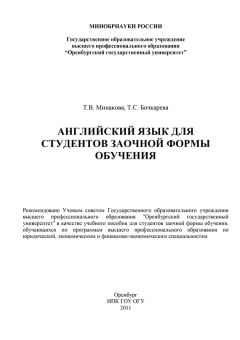Текст книги "Английский язык для студентов заочной формы обучения"

Автор книги: Татьяна Минакова
Жанр: Иностранные языки, Наука и Образование
сообщить о неприемлемом содержимом
Текущая страница: 7 (всего у книги 14 страниц) [доступный отрывок для чтения: 5 страниц]
IV семестр для специальности «Государственное и муниципальное управление»
2.4.2.1. Задание 1. Прочитайте и запомните следующие слова и словосочетания:
tribution – to transfer – переводить;
expenditure – затраты;
tyment –
interest – процент;
debt – долг;
tax revenues – налоговые поступления, доходы от налогов;
scale – масштаб;
income – доход;
national income – национальный доход;
resource – источник;
tank – танк;
to affect – действовать, влиять;
to ensure – обеспечивать;
to obey – подчиняться, повиноваться;
to implement – проводить в жизнь;
controversial – спорный, неоднозначный;
eventually – в конце концов;
to allocate – выделять (средства);
consumer – потребитель;
to assert – утверждать, отстаивать;
possibility – возможность;
target – цель;
to remain – оставаться, сохраняться;
welfare payments – социальны выплаты;
unemployment’s benefit – пособие по безработице;
disincentive effects – сдерживающие обстоятельства.
2.4.2.2 Прочитайте текст А переведите его письменно
Text A. The Role of Government
Having mentioned the effect of government tax policy on the income attribution, it's necessary to examine in greater detail the role of the Government in society. In every society governments provide such services as national defence, police, public education, firefighting services, and the administration of justice. In addition, governments through budget make transfer payments to some members of society. Transfer payments are payments made to individuals without requiring the vision of any service in return. Examples are social security, retirement pensions, unemployment benefits, and, in some countries, food stamps. Government expenditure, whether on the provision of goods and services (defence, police) or on transfer payments, is chiefly financed by imposing taxes, although some (small) residual component may be financed by government borrowing. Tabl. 2 compares the role of the government in four countries.
In each case, we look at four measures of government spending as a percentage national income: spending on the direct provision of goods and services for the c, transfer payments, interest on the national debt, and total spending.
Italy is a "big-government" country. Its government spending is large and it to raise correspondingly large tax revenues. In contrast, Japan has a much smaller government sector and needs to raise correspondingly less tax revenue, differences in the scale of government activity relative to national income differences in the way different countries allocate their resources among competing uses.
Table 2 – Government Spending as a Percentage of National Income (%)

Governments spend part of their revenue on particular goods and services as tanks, schools and public safety. They directly affect what is produced low share of government spending on goods and services in Table 2 reflects the very low level of Japanese spending on defence.
Governments affect for whom output is produced through their tax and transfer payments. By taxing the rich and making transfers to the poor, the government ensures that the poor are allocated more of what is produced than would otherwise be the case; and the rich get correspondingly less.
The government also affect how goods – are produced, for example through the regulations it imposes. Managers of factories and mines must obey safety requirements even where these are costly to implement, firms are prevented from freely polluting the atmosphere and rivers, offices and factories are banned in attractive residential parts of the city.
The scale of government activities in the modern economy is highly controversial. In the UK the government takes nearly 40 per cent of national income in taxes. Some governments take a larger share, others a smaller share. Different shares will certainly affect the questions what, how and for whom, but some people believe that a large government sector makes the economy inefficient, reducing the number of goods that can be produced and eventually allocated to consumers.
It's commonly asserted that high tax rates reduce the incentive to work. If half of all we earn goes to the government, we might prefer to work fewer hours a week and spend more time in the garden or watching TV. That is one possibility, but there is another one: if workers have in mind a target after-tax income, e.g. to have at least sufficient to afford a foreign holiday every year, they will have to work more hours to meet this target when taxes are higher.
Whether on balance high taxes make people work more or less remains an open question. Welfare payments and unemployment benefit are more likely to reduce incentives to work since they actually contribute to target income. If large-scale government activity leads to important disincentive effects, government activity will affect not only what, how, and for whom goods are produced, but also how much is produced by the economy as a whole.
This discussion of the role of the government is central to the process by which society allocates its scarce resources. It also raises a question. Is it inevitable that the government plays a prominent part in the process by which society decides how to allocate resources between competing demands? This question lies at the heart of economics.
2.4.2.3 Задание 3. Ответьте на вопросы по тексту
1 What does government provide in very society?
2 Through what do governments make transfer tyments to some members of society?
3 What does “transfer payments” mean?
4 What are four measures of government spending?
5 What is tax revenues so large in Italy?
6 What do governments affect?
7 How many per cent of national income does the UK government take in taxes?
8 What questions will different shares certainly affect on?
9 Do high tax rates reduce the incentive to work?
10 What question lies at the heart of economics?
IV семестр для специальности «Управление персоналом»
2.4.2.4 Задание 1. Прочитайте и запомните следующие слова и словосочетания:
job applicant – претендент на рабочее место;
overqualified person – сверхквалифицированный человек;
application form – анкета поступающего на работу; бланк для заявления;
background – биографические данные (все, что связано с жизнью, образованием и т. п. человека);
to meet requirements – удовлетворять требованиям;
reference – 1) рекомендация; 2) поручитель;
personal interview – личная встреча, беседа;
courteous ['katjas] – вежливый, любезный;
physical examination – врачебный/медицинский осмотр;
aptitude – способности;
achievements – достижения;
intelligence – интеллект;
personality – личные свойства и особенности характера, определяющие личность;
honesty ['onisti] – честность;
checking – сопоставление, сравнение;
employee handbook – справочник работника;
pay rates – ставки заработной платы;
fringe benefits – дополнительные льготы (пенсия, оплаченные отпуска и т. п.);
compensation – вознаграждение;
incentive plan – система поощрительных вознаграждений;
payroll – платежная ведомость;
benefits – льготы;
profitability – рентабельность, доходность.
firing – увольнение;
originally – первоначально;
personnel policies – кадровая политика;
via [vaia] – посредством чего-л., с помощью чего-л.;
policy handbook – инструкция о правилах распорядка;
memo сокр. от memorandum – служебная записка, докладная записка;
degrading performance – ухудшение работы;
probationary period – испытательный срок;
promptly – быстро, сразу;
credibility – доверие;
to procrastinate – откладывать, отсрочивать;
termination of employment – окончание срока службы;
consequences – последствия;
confidence – секретность, конфиденциальность;
grounds for dismissal – причины, основания увольнения.
2.4.2.5 Задание 2. Прочитайте тексты А, В переведите их письменно
Text A. Hiring new Employees
Screening of Job Applicants
The screening process provides information about an individual's skills and knowledge enabling a potential employer to determine whether that person is suited to, and qualified for, the position. Experience has shown that hiring an overqualified person can be as harmful as hiring an under qualified person.
The application form can be used to begin screening candidates for a job. It provides information on the person's background and training and is the first means of comparing the applicant with the job description. This will ensure that you don't waste time on applicants who clearly do not meet the minimum requirements for the job.
Generally, the following information is asked on an employment application form: name, address, telephone number, kind of work desired, work experience, education and references.
The personal interview is the second step in the screening process. During the interview, the manager learns more about the applicant. The interview should be guided, but not dominated, by the manager, as it is important to let the candidate speak freely. Whenever possible, the interviewer should ask questions that are directly related to the job.
A list of questions helps assess the applicant's qualifications that meet the specifications for the job.
Interviewing makes the selection process more personal and gives the interviewer an overall idea of whether the applicant is appropriate for the job. The following list of techniques will help you select the right applicant for the job:
1 Review the job description before the interview.
2 Establish a friendly atmosphere.
3 Develop an interview time plan.
4 Don't form an opinion too early.
5 Give the candidate time to tell his or her story; don't talk too much.
6 Present a truthful picture of the company and the job.
7 Listen carefully and take notes.
8 Avoid detailed discussion of salary too early in the interview.
9 Be courteous.
10 Discuss with the candidate the next step in the hiring process and the timing.
Other screening techniques include employment tests and physical examinations. Some employment tests measure aptitude, achievements, intelligence, personality and honesty. A physical examination determines if the applicant meets the health standards and physical demands of the job.
Selecting and Hiring
If the screening process is thorough, selecting the best applicants for the job is easy. However, before making the final selection, one last step should be taken: the top candidate's references should be checked for accuracy. You should be aware of the tendency of references to give a rose-colored picture of applicant's character and ability. A careful check with former employers and other references can be most constructive. Checking can determine whether or not the applicant was truthful about his or her employment history.
Orienting New Employees
An employee handbook gives important information about the company to the employee. The handbook should cover topics such as pay rates, working conditions and fringe benefits.
When an individual is hired, he or she should receive a comprehensive orientation on the specific nature of the job. Rules should be explained in detail, and any questions answered before the new employee begins work. New employees should be introduced to other employees and made to feel welcome.
Compensation Issues
Compensation takes two forms: (1) direct compensation (wages and salaries) and (2) indirect compensation (fringe benefits).
Direct Compensation – Wages and salaries are the compensation people receive on a regular basis (monthly, biweekly or weekly). Workers are paid on the basis of time (by the hour, day, week or month) or on the basis of output (an incentive plan).
Indirect Compensation – Fringe benefits are an important part of the overall compensation in most small businesses. Enlployee benefits now account for about 40 percent of payroll costs. The profitability of the small firm is one of the primary factors of benefits offered by the firm.
Text B. Firing Employees
1.You should consider firing the employee only if you have made the following steps:
a) given the employee clear indication of what you originally expected from him or her (via a written job description previously provided to the him or her);
b) have clearly written personnel policies which specify conditions and directions about firing employees and the employee has signed a copy of the policy handbook to verify that he or she had read the policies;
c) warned the employee in successive and dated memos which clearly described degrading performance over a specified time despite your specific and recorded offers of assistance and any training (the number of memos depends on the nature of the problem, but should be no more than three or four); and
d) you clearly observe the employee still having the performance problem. (Note that if the employee is being fired within a probationary period specified in your personnel policies, you may not have to meet all of the above conditions.)
2. Take a day or so to consider what you are going do. Consult with members of your board (in the case of corporations).
3. If you still decide to fire the employee, do so promptly both for your credibility with other employees and so as not begin procrastinating about this rather painful event.
4. Write letter of termination of employment to the employee. As with the previous letters of warning, be clear about the observed behaviors, when you saw them, earlier warnings and their consequences, what you did in response, and the consequences that must now follow according to your policies.
5. Tell the computer system administrator to change the employee's password and make sure that this action should be done promptly and in complete confidence.
6. Meet with the employee. Provide them the letter. Explain how the termination will occur, including when, what they must do, what you request from them and when. Ask for any keys. Give them a half hour or so to remove personal items (you may choose to monitor them during this removal, depending on the nature of the grounds for dismissal). Consider changing the door locks to the facilities. Change the passwords on phone systems.
2.4.2.6 Задание 3. Ответьте на вопросы по текстам А, B
1 What information is necessary to determine whether the applicant is suited to the position he/she wants?
2 What an interview with the applicant should be?
3 What techniques of conducting an interview help to select the right applicant for the job?
4 What topics should an employee handbook cover?
5 What are the two forms of compensation for work? Describe them.
6 What are the steps in firing the employee?
7 What may be the main reasons of firing the employee?
2.4.3 Тексты для студентов специальности «Документоведение и документационное обеспечение управления»2.4.3.1 Задание 1. Прочитайте и запомните следующие слова и словосочетания:
contract – контракт, соглашение;
Seller and Buyer – покупатель и продавец;
value – стоимость, цена, оценка;
FOB, CIF – базисные условия поставки;
loading – погрузка;
time of delivery – срок поставки;
to ship – производить погрузку;
irrevocable confirmed – безотзывный подтвержденный;
Letter of Credit – аккредитив;
vessel – судно, самолет;
Bill of Lading – транспортная накладная на груз при морских перевозках;
act – дело, постановление, акт;
liabilities under the contract – обязательства сторон по контракту;
delay in delivery – задержка в поставке;
force majeure circumstances – форс – мажорные обстоятельства;
arbitration – арбитраж;
subject of the contact – предмет контракт;
an integral part of the contract – неотъемлемая часть контракта;
tonal value of the contract, total contract value – общая сумма контракта;
spare and wear parts – запасные и изнашиваемые детали;
freight – фрахт (судна и т. п.);
specification – спецификация, технические условия;
to be valid – быть действительным;
destination – место назначения;
shipping documents – отгрузочная документация;
waybill – транспортная накладная;
consignor, shipper – грузоотправитель;
consignee – грузополучатель;
shipping specification – отгрузочная спецификация;
shipment, consignment – груз, партия товара;
shipment – погрузка, перевозка;
packing – упаковка;
marking – маркировка;
to consider null and void – считать не имеющим силы.
2.4.3.2 Задание 2. Прочитайте текст А и переведите письменно
Text A. The Сontract
After talks in Brighton Victor Klimenko has signed the contract between Continental Equipment and TST Systems for the supply of processing equipment. Here are some clauses of this contract.
Continental Equipment Pic, Brighton, England, hereinafter referred to as "the Seller", on the one part, and TST Systems Ltd., Kiev, Ukraine, hereinafter referred to as "the Buyer", on the other part, have concluded the present contract as follows:
1. Subject of the Contract
1.1. The Seller has sold and the Buyer has bought the machinery, equipment, materials, and services ("Equipment") as listed in Appendix 1 being an integral part of this Contract.
2. Prices and Total Value of the Contract
2.1. The Total Contract Value is as follows:

2.2. The prices are understood to be CIF Odessa including cost of packing, marking, loading on board a ship, stowing and fastening the eqipment in the hold, and the cost of the materials used for this purpose.
2.3. The prices are firm for the duration of the Contract and shall not be subject to any revision except on account of any mutually agreed changes or modifications to equipment specification and/or quantities listed in Appendix 1 to this Contract.
3. Time of Delivery
3.1.The equipment specified in Appendix 1 of the present Contract is to be delivered within two (2) months from the date of opening the Letter of Credit specified in Clause 4.1 of this Contract.
3.2.The delivery date is understood to be the date of the clean Bill of Lading issued in the name of the Buyer, destination Odessa,Ukraine.
4. Terms of Payment
4.1. Within thirty (30) days from the date of signing this Contract, the Buyer is to open in favour of the Seller an irrevocable confirmed Letter of Credit with CityBank, London, for hundred per cent (100 %) of the total contract value, the Letter of Credit is to be valid for three (3) months.
4.2. Payment from this Letter of Credit at the rate of hundred per cent (100 %) of the total contract value is to be effected in GB pounds against the following shipping documents:
4.2.1. Original Bill of Lading issued in the name of the Buyer, destination Odessa, Ukraine.
4.2.2.Shipping Specification.
4.2.3.Certificate of Quality.
4.2.4.Certificate of Origin.
4.2.5.Packing List.
4.2.6. Insurance Policy.
5. Technical Documentation
5.1. Within five (5) days from the delivery date the Seller shall send two (2) sets of the technical documents as listed in Appendix 2 to the address of the Buyer.
5.2. All instructions on the drawings are to be in English, with all the instructions contained in Items 1,2,3, and 4 of Appendix 2 translated into Russian.
6. Guarantee of the Quality of theEquipment.
6.1. The guarantee period is velve (12) months from the date of the start-up of the equipment, that is reflected in an appropriate Act Signed by the representatives of the Parties to the present Contract, but not more than eight (18) months from the date of delivery of the equipment.
6.2. If the equipment proves to be defective or faulty during the guarantee period, the Seller has at its expense at the choice of both Parties either to remedy the defects or to replace the faulty equipment with new equipment of good quality which is to be delivered without delay to the port of delivery.
7. Packing
7.1. The equipment is to be shipped in export sea packing suitable for the type of equipment delivered. Packing should also be suitable for transshipment in transit and reasonable long storage of the equipment.
7.2. Each container is not to exceed the following dimensions: length = 2,500 mm, width = 2,500 mm, height = 2,500 mm.
7.3. The Seller is responsible to the Buyer for any damage to the equipment resulting from inadequate packing of the equipment.
8. Marking
8.1. All the containers are to be marked on three (3) sides. Each container should bear the following markings made in indelible paint (in Russian and English):
Contract No.
Seller: Continental Equipment Plc (Address)
Buyer: TST Systems Ltd. (Address)
Railway Station of Destination:
Container No:
Gross weight: ___ kg
Net weight: ____
Case dimentions in cm (length *width*height)
8.2. If a case requires special handling it should bear additional marks: “Fragile”, “Top” or “This side up”, etc.
9. Shipping Instructions and Notifications
9.1. Within twenty-four (24) hours after shipment, the Seller is to inform the Buyer by fax regarding the date of shipment, the Bill of Landing number, number of containers, their weight, the vessel name.
10. Insurance
10.1. The Seller is to take care of and cover expenses for insurance of the equipment under the Contract from the moment of its dispatch up to the moment of its arrival at the port of Odessa.
11. Sanctions
11.1. In the event of delay in delivery of the equipment the Seller is to pay the Bayer a penalty at the rate of 1.0 % of the total contract value for every week of delay. However, the total amount of penalty for delay in delivery is not to exceed 10 % of the total Contract value.
11.2. While calculating penalty for delay, the amount of days comprising over half of a calendar week is considered to be a full week.
12. Force Majeure
12.1. The Parties are released from their responsibility for partial or complete nonexecution of their liabilities under the Contract should this non-execution be caused by the force majeure circumstances including, but not limited to: fire, flood, earthquake, and if these circumstances have had a direct damaging effect on the execution of the present Contract.
12.2. The Party which is unable to fulfil its obligations under this Contract is to inform the other Party within ten (10) days from the beginning of force majeure circumstances.
13. Arbitration
13.1. The Seller and the Buyer will take all possible measures to settle amicably any disputes or differences which may arise out of the present Contract or in connection with it.
13.2. If the Parties do not come to an agreement, all the disputes and differences are to be submitted for Arbitration in Stockholm, Sweden, in accordance with the rules and regulations of the Chamber of Commerce in Stockholm and applying the substantive laws of Sweden.
14. Other Terms
14.1. The Seller upon written consent of the Buyer shall be permitted to substitute equipment of comparable quality and conforming to the technical requirements for any item of equipment that may not be available for one reason or another.
14.2. Any changes, amendments or supplements to the terms arid conditions of this Contract shall be valid only if set forth in a written document duly signed by authorized representatives of both Parties to the present Contract.
14.3. After the Contract has been signed all the preliminary agreements, discussions and correspondence between the Parties concerning this Contract are to be considered null and void if conflicting with Contract.
14.4 The Contract becomes effective and comes into full force from the date of signing.
15. Legal Addresses of the Parties


2.4.3.3 Задание 3. Ответьте на вопросы по тексту А
1 What is the subject of the Contract?
2 What are the prices and the Total Value of the Contract?
3 What is the time of delivery?
4 What are the terms of payment?
5 What is the guarantee of the Quality of the equipment?
6 What are the requirements of packing and marketing?
7 What is about shipping instructions and notifications?
8 What are the requirements of insurance and sanctions?
9 What does the term “force majeure” mean?
10 What can you say about other terms?
Правообладателям!
Данное произведение размещено по согласованию с ООО "ЛитРес" (20% исходного текста). Если размещение книги нарушает чьи-либо права, то сообщите об этом.Читателям!
Оплатили, но не знаете что делать дальше?








































